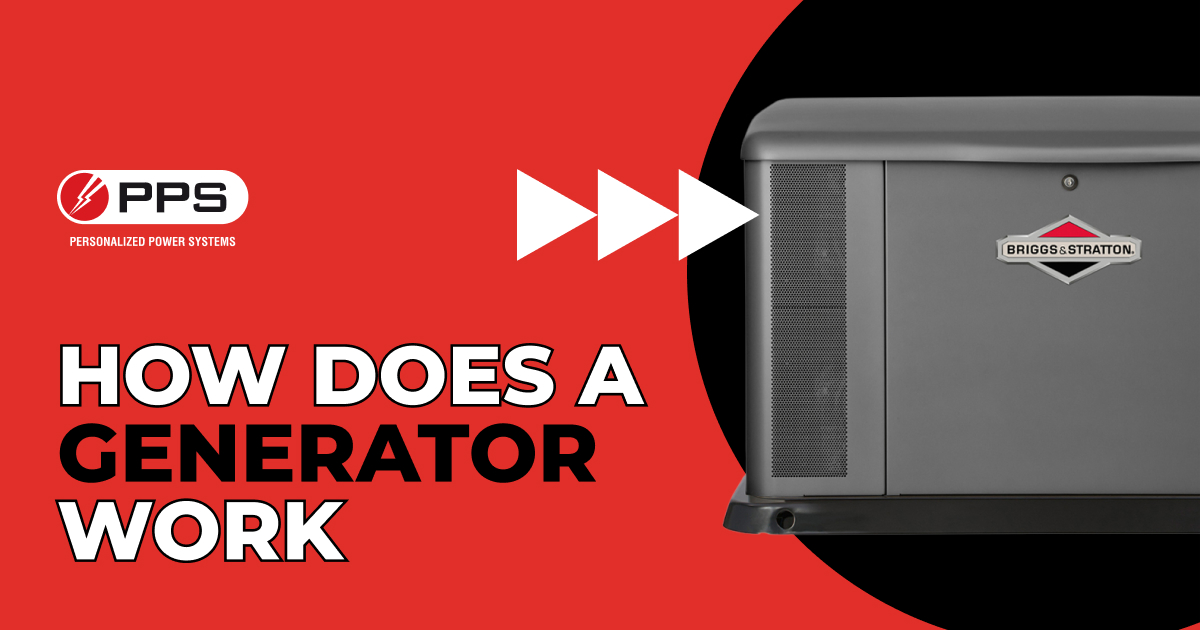There is nothing more dreadful or chaotic than being caught in a storm without any power to keep your house operating as needed. When storms hit Florida or Texas, the residents can easily be stuck without electricity for days, depending on the severity of the storm. This means no hot showers, no light in the house, and no cooking. To avoid this situation, the electricity experts at Personalized Power Systems highly recommend investing in a standby generator.
In this article, we will discuss what a generator is, how it works, and define some of its main parts. Read on to learn why generators are the saving grace during a severe weather storm.
What is a Generator?
So what exactly is a generator, and why is it so important? A generator is a standby device connected to your home’s power system but works independently. When the power in your home goes down, the generator will fire up to provide the much-needed electricity. Generators use a separate source of power and convert it into electricity. Here are the most common sources of power that generators use to provide the home with backup energy:
- Gasoline
- Diesel
- Solar
- Natural gas
- Propane
The type of generator you use will depend on many factors, such as your personal budget, the power source of your home, and its needs. Your generator installation tech will be able to guide you in selecting a generator that is right for you, including performing an assessment for whole house generator sizing to ensure that it will accommodate your entire home.
Speaking of weather storms, do you know how essential generators were in the face of the recent Hurricane Ian? Check out our blog to learn about the crucial role generators played for those affected by this awful storm.
Parts of a Standby Generator
Generators are built differently, depending on their power source and whether they are portable. However, when you look at your generator, you will find the following common parts that provide your home with electricity.
Frame
The frame of a standby generator is the casing around the electrical and moving parts. It helps keep these parts clean and dry. When a technician comes to service your generator, he will assess the health of the entire generator and ensure that it is clear of all dust, grime, and debris.
Rotating Shaft
The rotating shaft is a cylinder-shaped part that pokes out of the center of the engine motor. This shaft makes the motor or its propellers spin the armature inside the stator of the generator’s engine. If the rotating shaft doesn’t work, your generator won’t work either. Therefore, repair techs will check the rotating shaft first when a generator is out of order.
Stator
The standby generator’s stator is an electronic component that stands in place. It houses electrical coils that send electricity to the rotating part of the generator.
Armature
Otherwise known as a rotor, an armature is the part that moves in a rotating motion to produce a magnetic field. This is done via induction, magnets, or an exciter. This rotor is in charge of making the electrical output needed for your home.
Bearings
As the armature rotates to create the necessary electrical output, it creates friction. To help reduce this friction, bearings are installed in each generator which assists the rotors in operating smoothly as they work to produce the energy.
Field Windings
The field windings are a unique set of coils found on a standby generator’s field magnet. Their essential role is to help fire up the generator. The current of electricity will flow through these coils, keeping the armature moving to produce the electricity.
Are you currently in the market for a new generator? Read our blog post where we compare Kohler vs. Generac generators.
Generator Maintenance & Installation Services
This article discussed the importance of generators and how they work. We also learned about some of the parts of generators and how they work to provide that standby energy for the home. If any of these parts fail, the generator may not work. As a result, periodic maintenance and repair is required. Contact Personalized Power Systems today to learn about the generator services available to you. Call us at (561) 349-6835.


